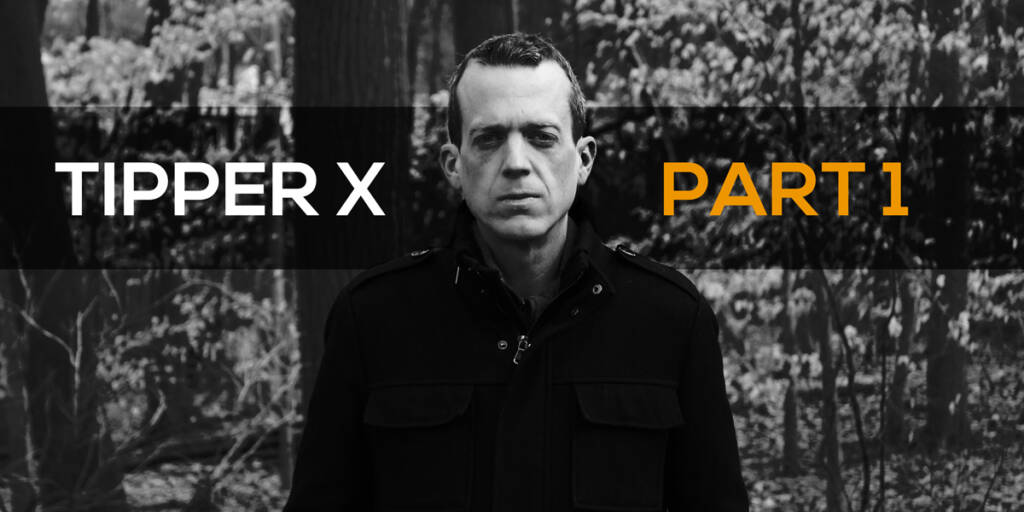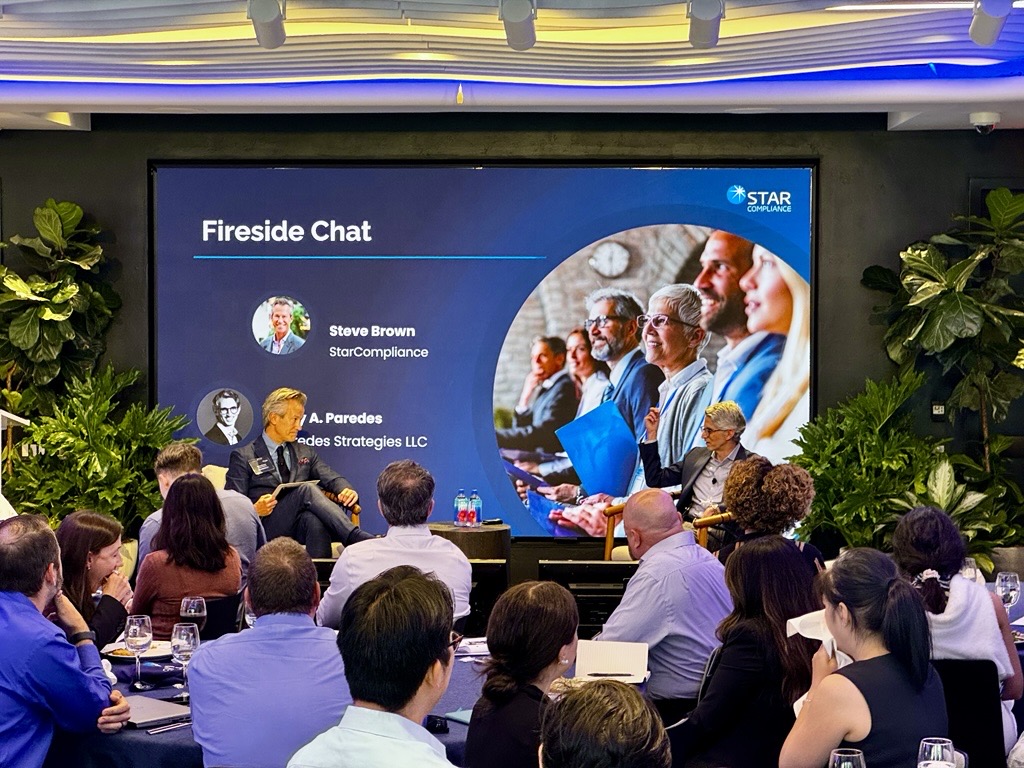Tipper X: 5 Takeaways On Insider Trading From A Former Inside Trader
Part one of a two-part blog series built around the keynote speech given at the 2020 Star Fall Forum by Tom Hardin, a.k.a., Tipper X—former inside trader turned FBI informant turned anti-inside trading crusader
“Ambiguity is the enemy of compliance and ethics. You need clear messaging from leadership. I take the blame for what I did, but as a young trader had I heard: ‘We have a zero tolerance policy, Tom. I know other firms are doing it, but we’re here to build this business, and are committed to doing so ethically.’ Had I heard that message, I may not have broken the law and thrown my career out the window at 29.’”
So offered Tom Hardin—a.k.a., Tipper X—at the recent StarCompliance Fall Forum. At the age of 28, Tom—a working-class kid from Atlanta who was the first in his family to attend college—landed a job at a small hedge fund in Greenwich, Connecticut. As a junior partner and rising star in the firm, he was introduced around a lot, and one of those introductions would be a fateful one. “Roomy Khan worked in Silicon Valley in the late 1990s,” says Tom. “Around 1998 she was working for Intel, and met Raj Rajaratnam in the first few months of his starting his own firm.” Over the course of several years Roomy and Tom’s intermittent professional connection had developed into a closer one, which eventually led to her tipping Tom on four trades based on MNPI. It was these trades that led the FBI to approach him about his insider trading activity and employ him as a cooperating witness in a case that would become the largest US insider-trading investigation in 25 years.
Today, Tom consults and speaks on conduct risk, ethics-and-compliance issues, and, of course, insider trading, with a truly peerless insider’s perspective. Following are five key takeaways from his Star talk.
1. AMBIGUITY IS THE ENEMY OF COMPLIANCE
As Tom related so succinctly above, ambiguity is the enemy of compliance and ethics. Compliance, of course, is a natural extension of ethics. Or rather, it should be. You can have compliance without ethics—fear can always keep a certain number of miscreants in line—but imbuing ethics in the culture is a firm’s best shot at comprehensively keeping a lid on bad behavior. Tom: “I think a clear message of zero tolerance would have been enough for me: a little voice in the back of my head that would have compelled me to say ‘we don’t engage in this type of stuff’ the first time Roomy called with a tip.”
2. BE CAREFUL THE COMPANY YOU KEEP, AND HIRE
Per Tom, that kind of response to the first tip probably would have ended his relationship with Roomy then and there. This is a worthwhile takeaway in and of itself. At one point or another, a parent or some other wise soul has probably told you to mind the company you keep. That you are who you hang around with. Tom: “One of the takeaways I always stress when presenting to business teams, is to think about themselves as the average of the five people with whom they surround themselves, and to therefore make those choices wisely. This is especially important early in employees’ careers, when they’re building their professional networks.” For compliance managers, who may have a hand in hiring new traders, or at the very least need to train them up to compliance and ethics standards, similar thinking applies, i.e., make ethics a guiding light of the employee vetting and compliance training process.
3. TRUST YOUR GUT, NO MATTER YOUR LEVEL OR JOB
Employees fresh to the industry may not have much experience to draw upon, are perhaps overeager to make connections to help their careers along, or haven’t heard the cautionary tales of colleagues yet. But even a new hire straight out of school can get a bad feeling about a situation they find themselves in or a person they’re dealing with, and they should listen to it. Tom: “When I met Roomy, she’d already gotten into some trouble. I didn’t know that. I met her at an investment conference where I met other investors, early on in my career. But looking back I could tell—at just 23 years of age and by just talking to her for a minute—that she wasn’t the most ethical person. It was how she went about her stock research. The kind of information she was trying to get from me.” Intuition counts, then, whether you’re an up-and-coming junior partner at a hedge fund or a compliance officer just starting out. A lifetime of dealing with other people has prepared you better than you know to sniff out funny business.
4. GOOD ETHICS ARE EVERYWHERE, AND POTENTIALLY NOWHERE
“Our small hedge fund was supposed to be investing on a one to three year time horizon,” says Tom. “But after losing money two out of three months, my boss comes into my office, closes the door, and says: ‘Tom, to be honest, we’re a small firm. We’re not going to be able to survive unless we start looking for opportunities to make money every month.’ I can tell you, that meeting stayed with me.”
Imagine how many times this kind of conversation has taken place in the financial services industry. The incredible pressure to perform in the short term, potentially at all costs. And that’s when the cracks in the ethical superstructure can start to appear. Tom: “It was also made clear to me my job was on the line. That if I didn’t start to produce I’d be fired. So in March of 2007 I got a phone call from Roomy, and she says: ‘Tom, I have something for you. But you can’t tell anybody.’ Good ethics are everywhere, or nowhere, in a firm, unless firms make sure it is. It’s not just how compliance handles ethics. Good ethics must permeate a firm.
5. DON’T BE AN OSTRICH, NO MATTER HOW TEMPTING
“As the junior partner at my two-person firm, I could initiate a stock position in our portfolio and not have to talk to my boss as long as it was less than 1.0% of the assets that we managed,” says Tom. “I remember calculating and buying a 0.9% position in our portfolio in Kronos, which I’d been tipped on, but it didn’t raise so much as an eyebrow. My boss skipped over it. We went over my positions every morning, and we only had 25 positions in the entire portfolio. There’s no way he didn’t notice the buy.”
So here’s a trader pushing right up against his buying limit and his manager doesn’t say a word. Why buy 0.9% and not 0.3%? Why buy 0.9% and not 1.5%? One reason to establish a position right under a proscribed limit is to try and sneak something through. If nothing else, the new position at least merited a mention, and a query as to why Tom established it. Tom: “My firm made $1.2 million on Kronos and three other illicit trades in 2007. We managed about $100 million in client money. So, you can quickly calculate how that helped our performance. That gave us a 1.0% jump right there.” And Tom’s boss not saying a word about the new position encouraged Tom to do more—sending a clear message alright, but not the kind an ethically grounded firm wants to send. Again, Tom: “I thought, ‘I buy such a small amount of stock. And I‘m just doing it to help the firm. I’m not making any money on this. And if my boss had a problem he’d call me out. I won’t do it again, just this once.’ When I talk to senior managers today, I say you have to question things. You can’t be an ostrich, with your head stuck in the sand. When you operate like that, the message you’re sending is: ‘Don’t tell me. I really don’t want to know whatever it is you’re doing.’”
There’s more to come from Tom Hardin. Look for part two of this two-part series and five more takeaways from Tom next week in this very space. In the meantime, find out more about Tom and his incredible journey from inside trader to FBI informant to anti-inside trading crusader—in his own words—by clicking on the banner below.
Best Practices Guide: Detecting Insider Trading

{





